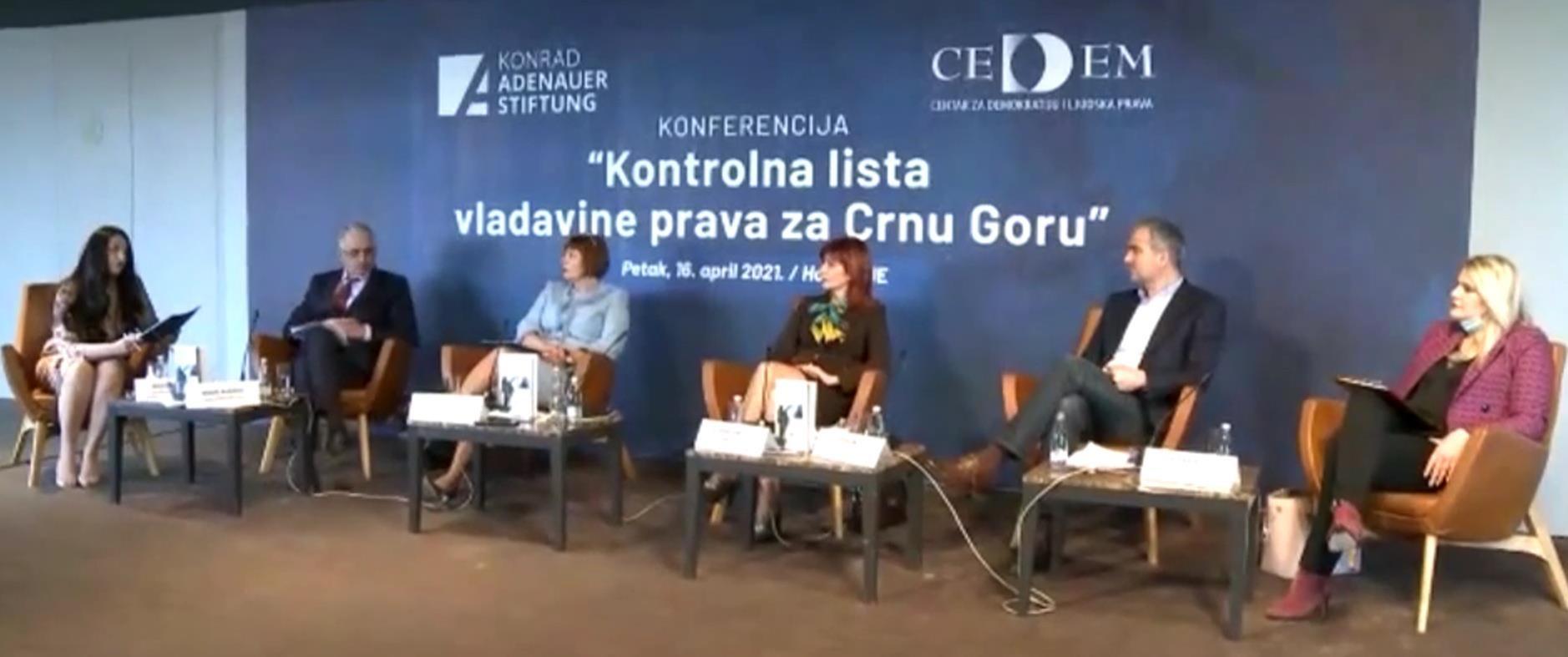Specialist conference
Details
In his introductory remarks, the Head of the Rule of Law Programme South East Europe, Hartmut Rank, pointed out that the rule of law at its core involves the limitation of arbitrary power and emphasized that rule of law is built on various pillars. One of the key pillars, he said, is the existence of strong and capable institutions that uphold the law. The checklist and the analysis on the rule of law in Montenegro based on it therefore focus on the extent to which state institutions have the capacity and willingness to implement law and act in accordance with the law.
Rank also discussed how difficult it is to measure the rule of law, as many factors play a role. As key indicators on which the analysis is based, he mentioned compliance with law, independence of judiciary and absence of corruption. In the present publication, it is a matter of assessing these criteria in practice, Rank said.
The former Secretary of the Venice Commission, Dr. Thomas Markert, indicated that without the rule of law, democracy and human rights cannot be guaranteed.
In his view, the rule of law is not a simple concept. Markert stressed that there is no universally valid mechanism to observe the state of rule of law in countries. For example, democracy is easier to measure through elections.
Markert briefly mentioned the background that led to the creation of the “Rule of Law Checklist” of the Venice Commission in 2016 and finally emphasized that the concept of the rule of law must be adapted in each country, as there may also be different ways of implementing the rule of law in different countries.
Afterwards, legal expert and author of the study "Rule of Law Checklist for Montenegro", Milorad Marković, explained that the study was prepared in the period from August to September 2020. The checklist is composed of 12 indicators with three basic indicators which are compliance with law, independence of judiciary and absence of corruption.
He first noted, that in Montenegro, the government is considered to be the main legislature, which leads to the conclusion that the parliament, as the highest legislative body, should improve their involvement in the legislation process. Marković also stressed the necessity to ensure and respect the proper implementation of the separation of powers in order to protect judges and the judiciary from external influence. Therefore, the laws should be amended so that the Minister of Justice and the President of the Supreme Court cannot be members of the Judicial Council and the Supreme State Prosecutor cannot be part of the Prosecutorial Council.
In his opinion, the fight against corruption ought also to be strategically reviewed. The law should be changed so that the Special Prosecutor's Office focuses only on serious corruption cases at a higher level and other prosecutors should extend their responsibilities to corruption cases at a lower level. The fact that three quarters of citizens believe corruption is part of everyday life is worrying, according to Marković.
Milena Bešić, Director at Center for Democracy and Human Rights Montenegro moderated the subsequent expert discussion. She introduced the discussion by pointing out that not only a fundamental and strategic thinking about the rule of law is necessary, but also the political will, the competence of individuals in institutions and an individual responsibility.
Miraš Radović, Supreme Court Judge and candidate for the President of the Supreme Court of Montenegro, stated that the independence and autonomy of the judiciary needs to be respected and protected by politicians. For him, the Minister of Justice should not be a member of the Judicial Council due to the possibility of his or her political influence.
Montenegro's representative before the European Court of Human Rights, Valentina Pavličić, highlighted that the rule of law cannot exist and be maintained by itself, but should be enforced by strong, independent and competent institutions. Both citizens and legislators must respect the laws. Furthermore, she believes that independence and accountability are inseparable in state institutions and that judicial decisions should be enforced more efficiently in practice.
The President of the Judicial Council of Montenegro, Prof. Dr. Vesna Simović-Zvicer, underlines the need to implement an international standard while respecting local circumstances.
As a member of the National Council for Combating Corruption at a high level, Stevo Muk stated that the average duration of an administrative dispute takes too much time. The integrity and efficiency of the administrative and constitutional courts must be improved so that the rule of law and the realization of human rights do not suffer and do not cause a loss of public trust.
The Prosecutor at the Supreme State Prosecutor's Office and Liaison Prosecutor for Montenegro at Eurojust, Jelena Đaletić, called attention to the fact that in order to improve the rule of law in practice, continuous cooperation and communication between state institutions is crucial while maintaining their individual independence.
(Report prepared by: Svenja Gutsche, intern)
Here you will find the program for download: Report_Rule of Law Checklist for Montenegro_finalEN.pdf





